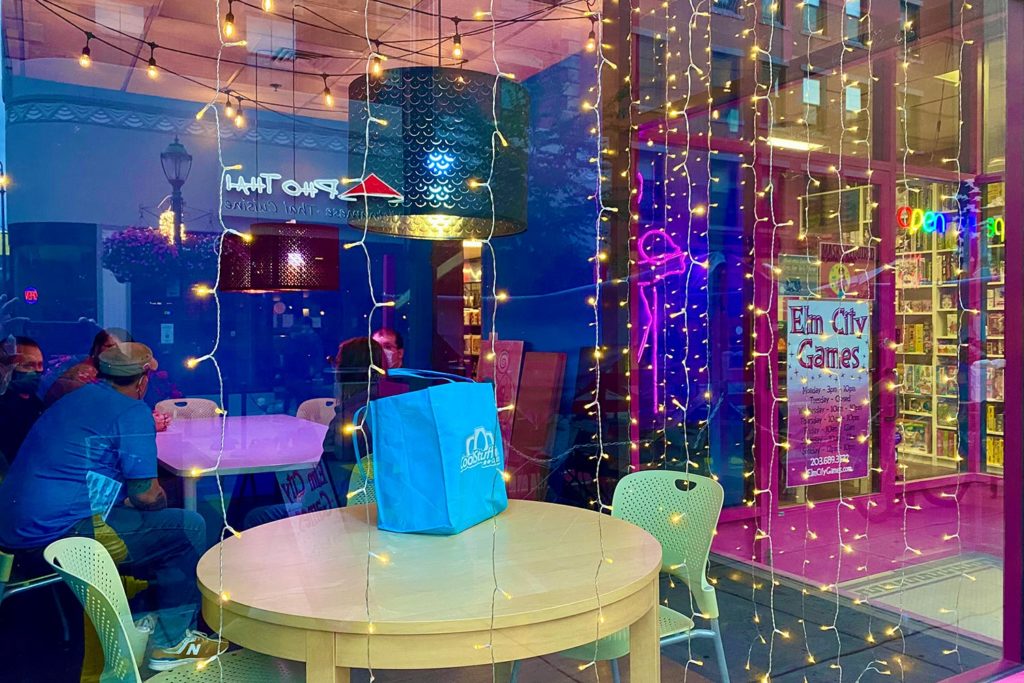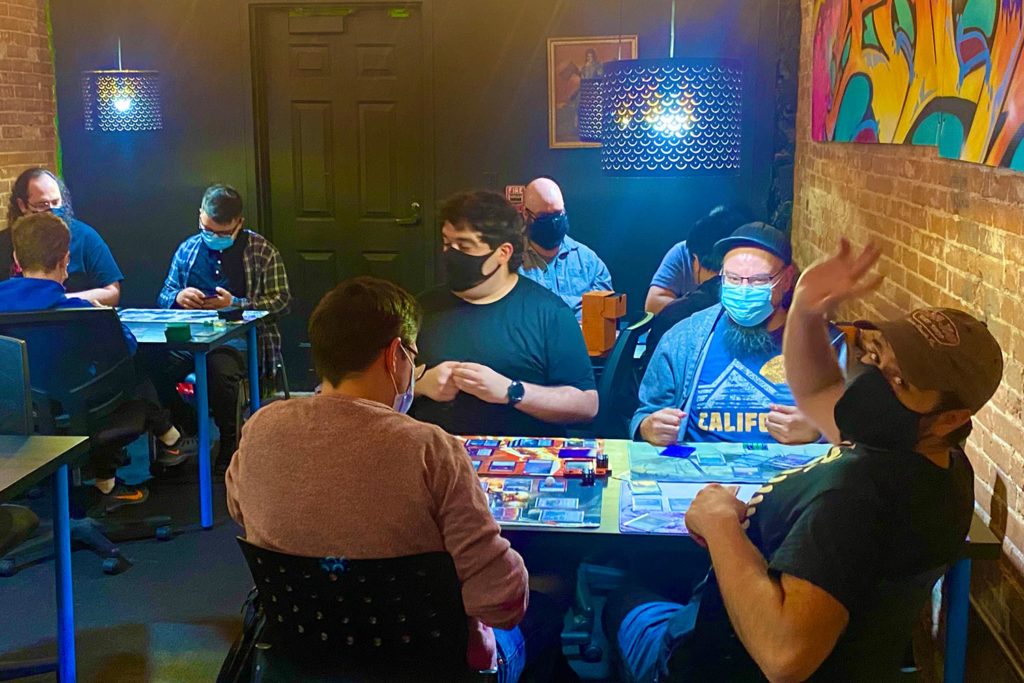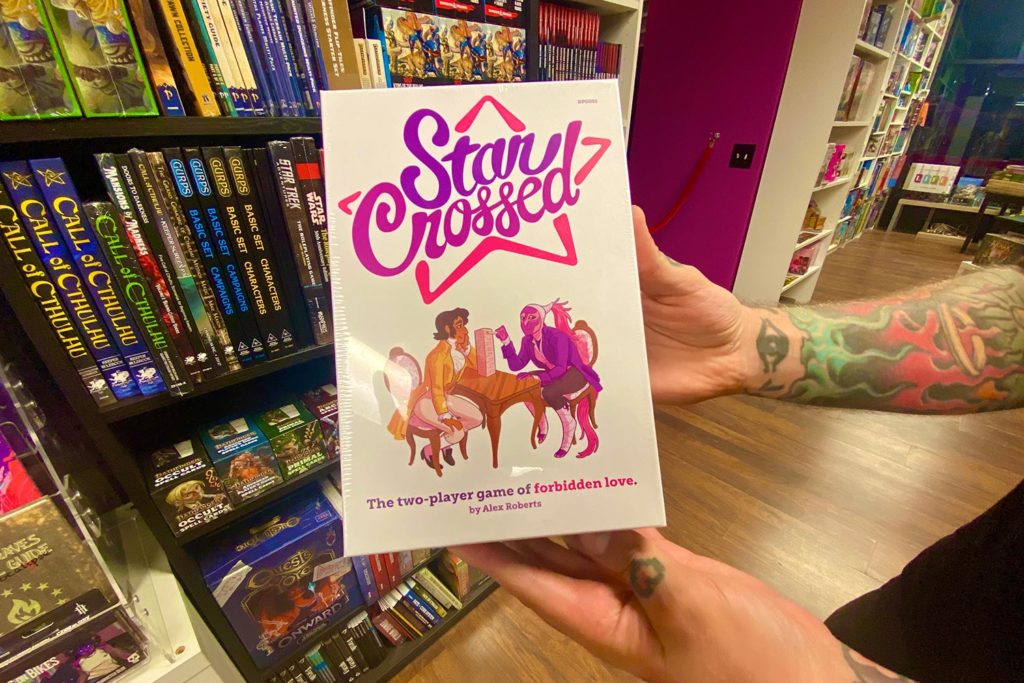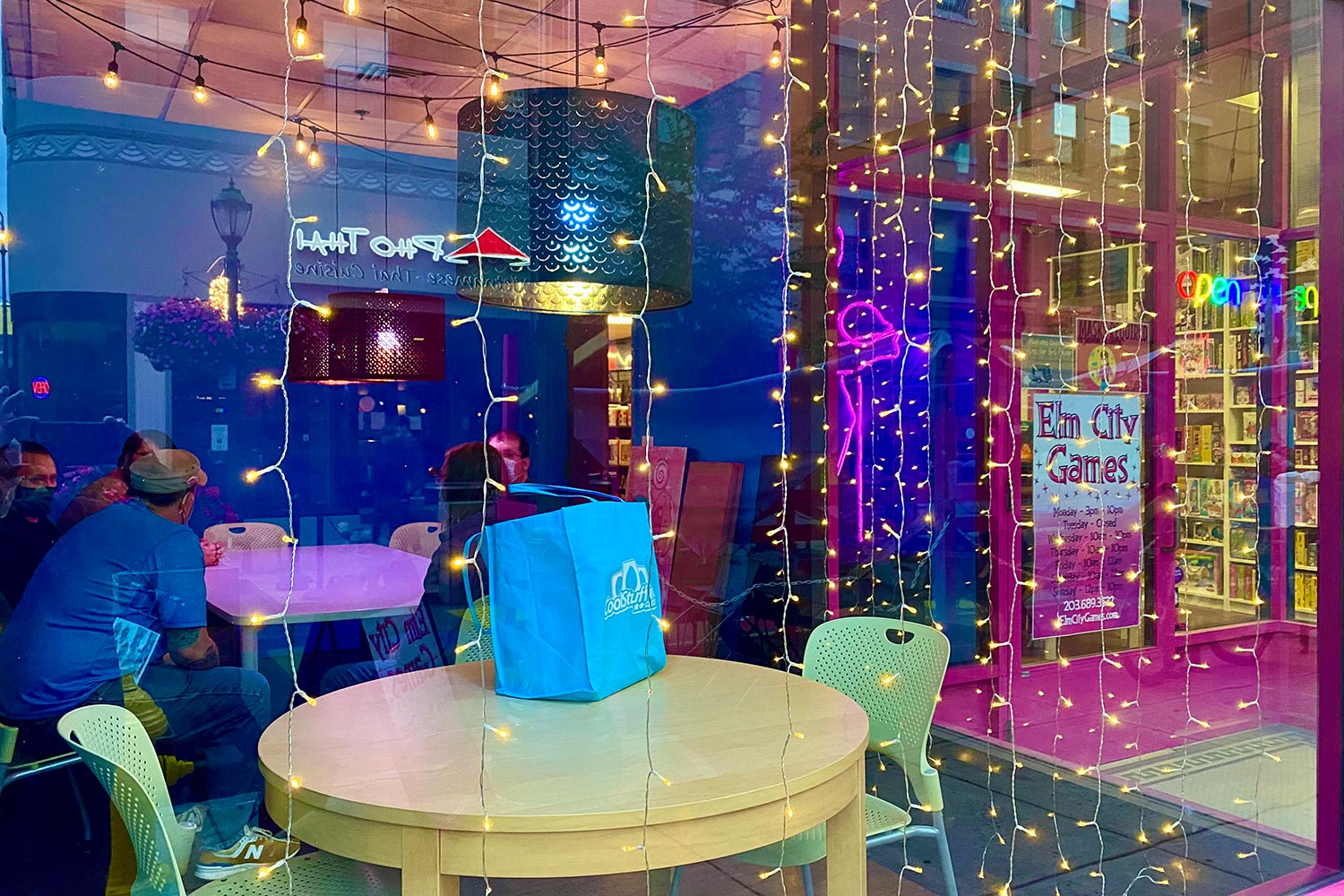Walk into the hot pink entrance of Elm City Games in the Ninth Square section of New Haven and enter a world of escape, fantasy and community — and a welcoming space for LGBTQ+ people headed by its like-minded staff.
 In the main room there’s an endless selection of games for sale that run the gamut from the classics — The Game of Life, Clue and more variations of Monopoly that you ever knew existed — to games from other countries, games inspired by films (“Star Wars” has an entire wall), to games that celebrate fantasy, test relationships and reflect LGBTQ+ life, created by LGBTQ+ designers.
In the main room there’s an endless selection of games for sale that run the gamut from the classics — The Game of Life, Clue and more variations of Monopoly that you ever knew existed — to games from other countries, games inspired by films (“Star Wars” has an entire wall), to games that celebrate fantasy, test relationships and reflect LGBTQ+ life, created by LGBTQ+ designers.
It’s Wednesday evening on Orange Street which means it’s game-testing night and over in one of the storefront rooms is a group of players trying out a new tabletop game, Knights of the Realm, led by Larry Bogucki of Middletown and Larry Swan of Stamford who created it.
Go down a hall decorated with whimsical designs by local artists and into a side room and you’ll find another group of competitors hunched over tables, focused on playing the same game, but in different round-robin couplings, over the course of the night.
In yet another room, there’s a library featuring more than 1,500 titles where anyone can just take whatever interests them of the shelf, sit down — and, well, let the games begin.
Elm City Games is the creation of Matt Fantastic (that’s his legal name), 39, who, with his ex-wife Trish Loter, own and manage the downtown complex since 2019.
“Games are for everybody,” says Fantastic, who, with his shoulder-length hair, big grin and tats could be conjured as a knight’s cool sidekick in Dungeons and Dragons.
“Not every game is for everybody,” he says, “but there is a game for everyone.”
That includes LGBTQ+ players, too, whether its Thirsty Sword Lesbians, Star Crossed (‘the two-player game of forbiodden love”) or Fog of Love, which has editions for straight and gay fans.
Elm City Games began in 2016 in the back of a Chapel Street coffee house by Fantastic and Loter. They would charge a fee for folks to play games from their massive collection. It became so popular they eventually opened up its present hobby gaming center.
Open community
But it’s more than just a retail store.
 “We are first and foremost an inclusive games community,” Fantastic says. “We’re big on ‘Third Place Theory,’ which is the idea we live our lives in three different places: home, work and the public space, which can be the local pub, a church, a bowling league. We are very much oriented around that community aspect of saying ‘Hey, just show up and see what’s happening. See who’s here. Let’s hang out.”
“We are first and foremost an inclusive games community,” Fantastic says. “We’re big on ‘Third Place Theory,’ which is the idea we live our lives in three different places: home, work and the public space, which can be the local pub, a church, a bowling league. We are very much oriented around that community aspect of saying ‘Hey, just show up and see what’s happening. See who’s here. Let’s hang out.”
But don’t expect any digital games in the shop. “Our expertise and passion is in tabletop,” he says.
Adds game designer Bogucki: “With board games you’re getting that human, face-to-face interaction that you can’t get from a screen. Besides, electronic games are designed so they can eventually be beaten. Humans aren’t, so it’s more satisfying.”
While still paling in comparison to the digital gaming industry at $140 billion in U.S. alone — “which is bigger than the film and music industries put together,” says Fantastic — tabletop games is less than $5 billion. Helping fuel the growth of the board game industry is the fact that more people stayed home during the pandemic and weren’t spending money on going out or for live entrainment.
While it sometimes takes many tens of millions of dollars to develop a new digital game, it doesn’t require a large investment to create a tabletop games, making it easier for local designers like Fantastic, Bogucki and Swan to enter the field as outliers. Their risk of introducing elements which may go against established norms and challenge its board game fanbase is low, says Fantastic.
D&D fan
Games have always been a part of his Fantastic life. Born and raised in Stamford, he grew up in a Greek-immigrant gaming family, which loved all board and card games. But Dungeons & Dragons became his personal passion, which led him to volunteer at game conventions, then as a paid worker there, where he fell in love with the atmosphere, the lifestyle and the progressive vibe of many of the fans. It also allowed him to tap into his playful personality.
“When I started out, I would wear princess dresses, which became a big part of my persona in the game industry where it’s important to be very visible,” he says. “It wasn’t me in drag. Just me as a princess, kind of a slutty Snow White.” But now the standards to stand out have changed. “Now no one cares that a guy is in a dress — and I love that.”
Fantastic is also a games designer, with several dozen published titles, including Team 3 — his take on the see/hear/speak-no-evil moneys — which is sold at Target.
Finding a role
He has a special fondness for role-playing games that are more than a just a roll of the dice. These games tap into players’ creativity as they imagine themselves as Victorian gentry, soldiers in World War One or knights in armor, requiring letter writing, maps drawing or making up scenarios where gamers are imaging their places in worlds, both old, new and never was.
Role playing games have particularly been attractive to LGBTQ+ people, says Fantastic “In games like Dungeons & Dragons, they can become whoever they want, creating safe spaces to explore things like gender.”
 There are also relationship games, such as Star-Crossed which is about couples in love — gay and straight included — but with complicating real-world divides. “It could be I’m a Suni and you’re a Shia or I’m a mermaid and you’re a land-dweller or Im a person and you’re a robot.”
There are also relationship games, such as Star-Crossed which is about couples in love — gay and straight included — but with complicating real-world divides. “It could be I’m a Suni and you’re a Shia or I’m a mermaid and you’re a land-dweller or Im a person and you’re a robot.”
Emotional games that could spur conflict include Fog of Love, a board game where couples trying to link up or another game where you’re in a contentious divorce and splitting up possessions, including your record collection, the dog and the kids. “It’s one that a lot of people have gotten up from the table crying because it can get really emotional.”
More LGBTQ+ Friendly
Though the games community has grown increasingly diverse, Fantastic says that stereotypes people make about gamers — of being predominantly white and male — are still valid. “They didn’t go anywhere. But the industry has grown that I’d say from 75 percent to 90 percent peopole now here are center-left, especially among the designers. There has always been the outsider side to the industry that has included a large amount of LGBTQ+ people.”
The characters on the game boards are changing too. “For years, they were a bunch of white guys and maybe one sexy lady. Now there’s a cornucopia of looks, body types, ethnicities and sexualities.”
While specific LGBTQ+ games might still not be plentiful, Fantastic says there’s a greater effort in trying to be more generally inclusive. “and less of ‘This is the gay game’ and more like, “Here are some characters and some are straight and some are queer and some are unclear.”
He says Elm City Games is an “aggressively values first” business and has refused to work with people and companies that don’t share his outlook.
“We also are very strict about behavior and language [at Elm City Games] and we’ve banned people. If you’re going to come here and be casually misogynistic or homophobic or whatever — hit the road. We found that over the years of doing that we have created a very diverse community. We’re actually a place where a lot of people feel safe to be out.”





More Stories
PRIDE 2024
Whose Flag is it, Anyway?
PFLAG Turns 50